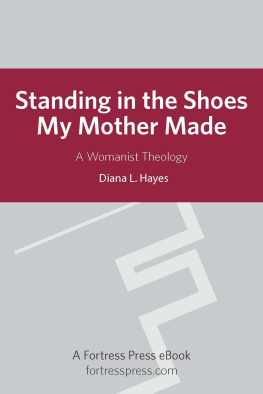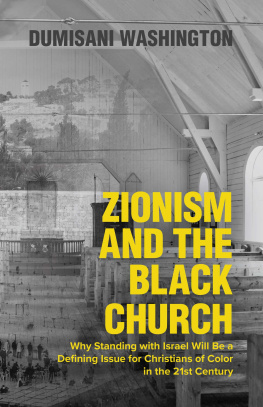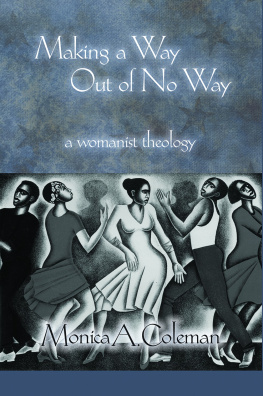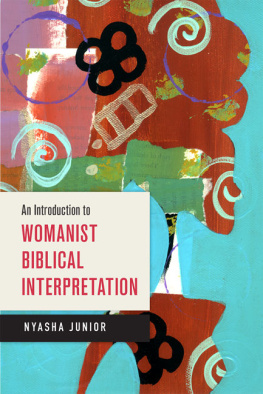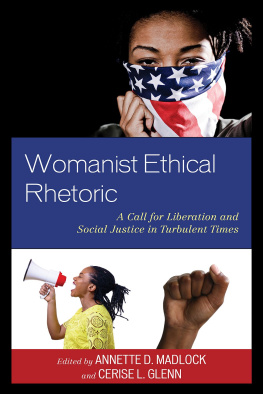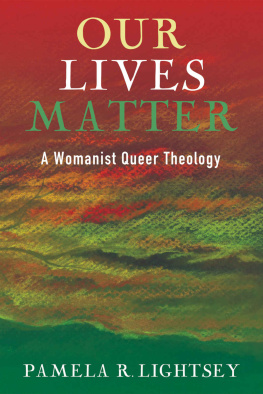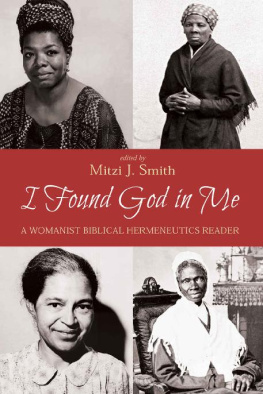STANDING IN THE SHOES MY MOTHER MADE

STANDING IN THE SHOES MY MOTHER MADE

A Womanist Theology
D IANA L. H AYES
Fortress Press
Minneapolis
STANDING IN THE SHOES MY MOTHER MADE
A Womanist Spirituality
Copyright 2011 Fortress Press, an imprint of Augsburg Fortress. All rights reserved. Except for brief quotations in critical articles or reviews, no part of this book may be reproduced in any manner without prior written permission from the publisher. Visit http://www.augsburgfortress.org/copyrights/ or write to Permissions, Augsburg Fortress, Box 1209, Minneapolis, MN 55440.
Scripture quotations from the New Revised Standard Version of the Bible are copyright 1989 by the Division of Christian Education of the National Council of Churches of Christ in the United States of America and are used by permission.
Cover image: The Jacob and Gwendolyn Lawrence Foundation / Art Resource, NY
Cover design: Laurie Ingram
Book design: PerfecType, Nashville, TN
ISBN: 978-0-8006-9757-0
eISBN: 978-1-4514-0657-3
Library of Congress Cataloging-in-Publication Data
Hayes, Diana L.
Standing in the shoes my mother made : a womanist spirituality / Diana L. Hayes.
p. cm.
Includes bibliographical references and index.
ISBN 978-0-8006-9757-0 (alk. paper)
1. African American CatholicsReligious life. 2. Womanist theology. 3. Hayes, Diana L. I. Title.
BX1407.N4H393 2010
282.7308996073dc22
2010019370
CONTENTS
THIS BOOK HAS BEEN a long time in the making. It is a compilation of lectures, book chapters, and articles written over the course of my journey as a womanist theologian. The earliest, Black Catholic Revivalism, was first published in 1986. The last, Bearers of Suffering, was given as a lecture in 2006. The book marks a time in my life to assess where I have come from and where I am going, for, although I have accomplished many things, I believe that the journey is not as yet over. This work then, and its companion, can be seen and read as a series of milestones on my journey from someone completely new to theology and the Roman Catholic faith to a Catholic womanist theologian with more than twenty years of experience teaching and lecturing in systematic theology. In addition, these chapters seek to reveal to those who read them the perspective of a woman of African descent in the United States who has, as have most black scholars, struggled to have her voice heard, especially within the Roman Catholic Church. I hope that Catholic readers will become more aware of the existence and persistence of persons of African descent in the Catholic Church from its inception to the present day Protestants also will be able also to learn of the long history of black Catholics in the Catholic Church as well as their persistent and faithful presence in the black Christian community. For all readers, I hope this work will serve as an introduction to the faith of black Catholic Christians and their participation in the development of Christianity in the United States from the sixteenth century onward. A key aspect of that experience is that, whether Catholic or Protestant, persons of African descent have worked and played together, have intermarried, and have in their own unique ways served as bridges to each other and to the larger world beyond the black community.
First, I must clarify my understanding of several key terms: feminist, womanist, black, and African American. I am a womanista Catholic, womanist theologian. Based on my understanding and experience, I define a womanist as a woman of African descent who, in the United States, has also historically been a Christian. Although the womanist movement has expanded globally to encompass black women from every profession and none, it was Christian, especially African American women who developed it into a theological movement, often in ways I am sure Alice Walker did not expect or necessarily agree with. An example of this development is that I, as a womanist, do not use the term inclusively for all women of color as she did. Today it encompasses women of African descent of many religious faiths and religions, including Muslim and Buddhist, as well as those for whom religion is not an aspect of their lives. For me, the most critical understanding of womanist is that of a woman of African descent, regardless of religious affiliation. Throughout this text, however, I will be using the term strictly in its theological sense, to describe a black, Christian, theological religious scholar.
The term feminist, for me, encompasses women of every race, but historically it has been seen more as a secular movement of predominately white women with an emphasis on gender issues. This too has changed as feminists, especially Latina and Asian feminists, have become equally engaged in issues of race and class as well as gender. However, for many, the emphasis is still primarily on gender, while womanists, as I define the term, have historically been engaged in the eradication of all forms of oppression, seeing them as intricately interlinked and therefore impossible to separate. The two movements, however, are not in opposition but seek to work in solidarity with each other and other theologies of liberation. In the introduction, I discuss these issues in greater depth.
In my understanding of blackness in the United States, the designation black has a collective or umbrella meaning (although that is changing as I write due to the election of the first black President in 2008). It basically includes anyone of African descent. Within that collective are African Americans, that is, persons of African descent who share a particular historythat of slavery in the United States dating back to the fifteenth century in the Spanish, French, and English colonies, a history that has affected, positively and negatively, their self-understanding and worldview, whether their ancestors were slave or free. Thus persons coming from the Caribbean of African descent are Caribbean Americans; those who have recently emigrated from African nations are Ghanaian, Nigerian, or similar Americans. The term African American was often regarded disparagingly by other blacks because of the link with slavery, but a growing number of black Americans, regardless of when they or their ancestors arrived in the United States, are now beginning to identify as African American, following the example of President Obama. In this text, I usually maintain this distinction but in some chapters use both terms interchangeably as I will note.
My struggle throughout this journey has been to bring to voice my concerns about the invisibility of black Catholics in their church, of which they have paradoxically been a critical and historical part since the first century of Christianity. I strive in my writings and lectures to raise awareness of the Catholic church as a church of persons of color who have remained faithful despite all that they have had to endure. I also have sought to raise the consciousness of other black Christians to the presence and participation of Catholics of African descent in Christianity from its earliest beginnings. Persons of African descent are not latecomers to Christianity nor to Catholic Christianity, but rather have been active in helping to formulate theologies, spiritualities, and ecclesiologies that emerge from our context as children of Africa, the Caribbean, and the United States who have been steadfast in their faith. Several chapters therefore relate the history of black Catholics and the theological understandings that have emerged from within their particular context.
Next page
